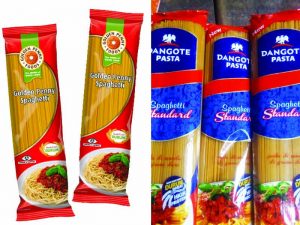Between Golden Penny Pasta and Dangote Pasta
June 1, 202015K views0 comments
By Uche Samuel Osuji
One of the most prominent staple food today is Pasta. Ease of its preparation and relative affordability has increased its patronage. This has caused more Pasta brands to spring up, both local and foreign. Improving product quality, attractive packaging, variants in multiple sizes, and ensuring affordability are factors
 manufacturers of Pasta in Nigeria are leveraging on to gain control of their sector’s market share. Pasta is made from unleavened dough of durum wheat flour. There are different types of Pasta: Spaghetti, Macaroni, Fettuccine, Fusilli etc. Spaghetti and Macaroni are by far the most popular types all in the country. However, customers are eating much of Spaghetti than Macaroni in Nigeria. Many persons attributed this to Spaghetti’s slippery nature. Spaghetti is a long, thin, and dried pasta made from durum. It can be enjoyed at any time of the day and in so many ways. Cooked plain with sauce, fried with vegetables, as Jollof, or as fillings for salads.
manufacturers of Pasta in Nigeria are leveraging on to gain control of their sector’s market share. Pasta is made from unleavened dough of durum wheat flour. There are different types of Pasta: Spaghetti, Macaroni, Fettuccine, Fusilli etc. Spaghetti and Macaroni are by far the most popular types all in the country. However, customers are eating much of Spaghetti than Macaroni in Nigeria. Many persons attributed this to Spaghetti’s slippery nature. Spaghetti is a long, thin, and dried pasta made from durum. It can be enjoyed at any time of the day and in so many ways. Cooked plain with sauce, fried with vegetables, as Jollof, or as fillings for salads.
Even though the pasta market is saturated with many brands, Golden Penny Spaghetti and Dangote Spaghetti are the most popular. Here’s what we found out about these two brands:
• Golden Penny Pasta is manufactured by Flour Mills Nigeria Plc. Dangote Pasta is manufactured by Dangote Pasta Limited.
• Both Dangote and Golden Penny Spaghetti are light and easy to cook pasta made from durum wheat semolina.
• Golden Penny Pasta variants include Golden Penny Spaghetti, Spaghettini, Couscous, Eliche, Macaroni, Twists (up to 13 variants). On the other hand, Dangote Pasta comes in the form of Spaghetti Standard, Spaghetti Slim, Twist Cavatto Macaroni, and Elbow Macaroni; fewer variants than Golden Penny Pasta.
• Dangote Pasta has 500gm Spaghetti Standard and the 200gm Spaghetti Slim sizes. Golden Penny Pasta Spaghetti is available in 500gms and 250gms sizes.
• Dangote Pasta takes only 8 minutes to prepare. Golden Penny Pasta takes about 10 minutes – a long time when compared to Dangote Pasta.
• Dangote Pasta is generally cheaper than Golden Penny Pasta. For instance, Golden Penny Spaghetti retail price is N250 per unit, whereas Dangote Spaghetti retail price is N200 per unit.
• Golden Penny pasta does not get soggy (overdone) when cooked like many other brands. According to a few consumers, Dangote Pasta requires drops of vegetable oil to keep it from sticking together in the pot as it tends to get soggy.
• While both Pasta is rich in protein. The amount of protein is 13g/100g in Golden Penny Spaghetti and 11.5g/100g in Dangote Spaghetti. Additionally, Golden Penny is marked as a no cholesterol pasta.
• According to the manufacturers, the calorie gained in 100g serving for Dangote Spaghetti is 1535kj, while Golden Penny Spaghetti offers 1525kj. Dangote Spaghetti and Golden Penny Spaghetti carbohydrate content are 74.4g/100g and 77g/100g respectively.
• One consumer mentioned that the routine consumption of Golden Penny Pasta (once a day) helps her lose weight.
• Several nutrition studies actually show that people who eat pasta regularly lose weight, as it is a lower-carb option.
• However, it should be noted that pasta has a low glycemic index (low GI), and causes small increases in blood sugar.
• Dangote Pasta has improved products and is rebranded in a new package.
• More consumers believe Golden Penny Spaghetti is tastier than Dangote Spaghetti.
• Chefs and restaurateurs suggested that Dangote Pasta is best for preparing continental dishes like Spaghetti cabonara, Jollof, or fried, with or without vegetables.
• Golden Penny Pasta is also less starchy than Dangote Pasta. Specifically, 63% persons voted Golden Penny compared to 37% for Dangote.
• The durum wheat taste is far more pronounced even after parboiling in Dangote Pasta than Golden Penny Pasta.
So far, Golden Penny Pasta and Dangote Pasta have edged out all others in the competition for market share. However, there is no doubt an intense competition lingers in this market even as more pasta brands are being introduced now and then. Both brands must continuously improve on the distribution channel and value proposition to remain the kings of this market.
